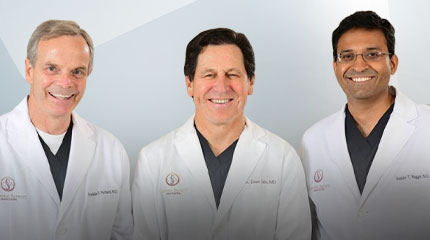Saline vs. Silicone Breast Implants: Which One is Right For You?
Conveniently located to serve the areas of Maryland, Virginia and Washington, D.C.
Posted on March 30, 2020 under Breast Implants
What’s the difference between saline and silicone breast implants?
The primary difference between saline and silicone implants is the contents of the silicone shell insert. Saline implants contain salt water, while silicone implants are filled with a more viscous silicone gel. During your consultation at Cosmetic Surgery Associates, a board-certified surgeon can help you decide the right choice for you.
What are the risks of breast implants?
Some of the risks associated with breast implants can fade over time, such as pain or changes in sensitivity in the breast. Others might require another surgery to fix, such as an infection, a ruptured implant, or the formation of scar tissue (capsular contracture) which can make the breast firm instead of soft.
What happens if an implant ruptures?
Ruptures happen for a variety of reasons. Whatever the cause of the rupture the implant should be removed, though a new implant can often be placed during the same surgery. When a saline implant is ruptured, the salt water is absorbed by your body with no ill effects. The gel in a silicone implant is more viscous than water and remains encased in the tissue that forms around the breast implant. In either case, a ruptured implant should have no long-term ill effects on your health, however, ruptured implants do require removal.
What factors might I consider before getting breast implants?
During your consultation at Cosmetic Surgery Associates, a surgeon will speak with you about the factors that you might weigh as you consider breast augmentation. Breast implants are not a remedy for sagging breasts. You might consider speaking with your surgeon about a breast lift as well as augmentation during your consultation if you would like to alter the shape and position of your breasts as well as the size.
Various factors can change the appearance of your breasts after augmentation. These include capsular contracture (scar formation around the breast implant) and, less frequently, implant migration. In the unusual event that these occur, Cosmetic Surgery Associates is dedicated to helping you maintain your cosmetic goals and sometimes additional surgery may be necessary.
Note that outside of the context of breast reconstruction or similar procedures, breast implants are not covered by health insurance as they are not medically necessary. An experienced surgeon at Cosmetic Surgery Associates can answer all your questions about the details of these factors as they relate to you.
What’s next?
We understand that the decision to undergo breast augmentation is highly personal and requires a lot of information. If you are interested in learning more about breast augmentation, contact Cosmetic Surgery Associates today to schedule a consultation with an experienced surgeon to discuss your individual needs.
Our Plastic Surgery Associates team includes Dr. Franklin Richards, Dr. A. Dean Jabs, and Dr. Keshav Magge. Each of our plastic surgeons is board-certified, and together they have over 60 years of combined experience. Drs. Richards, Jabs, and Magge are all highly qualified in procedures for the face, breast, and body, and pride themselves in providing excellent results through our state-of-the-art, Quad A certified operating centers






